
La Plénière CELPHEDIA 2025 aura lieu du 10-12 décembre prochain à MARSEILLE.
Durant 2 jours de conférences, 120 chercheurs et techniciens des 13 centres CELPHEDIA et son réseau se réuniront pour faire le bilan annuel des projets collaboratifs et les avancées des groupes de travail. Lors de cette plénière, il y a également un mini-colloque sur une ½ journée, ouvert au-delà des membres CELPHEDIA et réseau à toute la communauté scientifique et technique, et souvent cette demi-journée compte pour la formation continue pour l’expérimentation animale.
L’inscription est gratuite mais obligatoire avant le 12 novembre 18h sur le site https://celphedia.sciencesconf.org/
Dec. 10, 2025 - Dec. 12, 2025
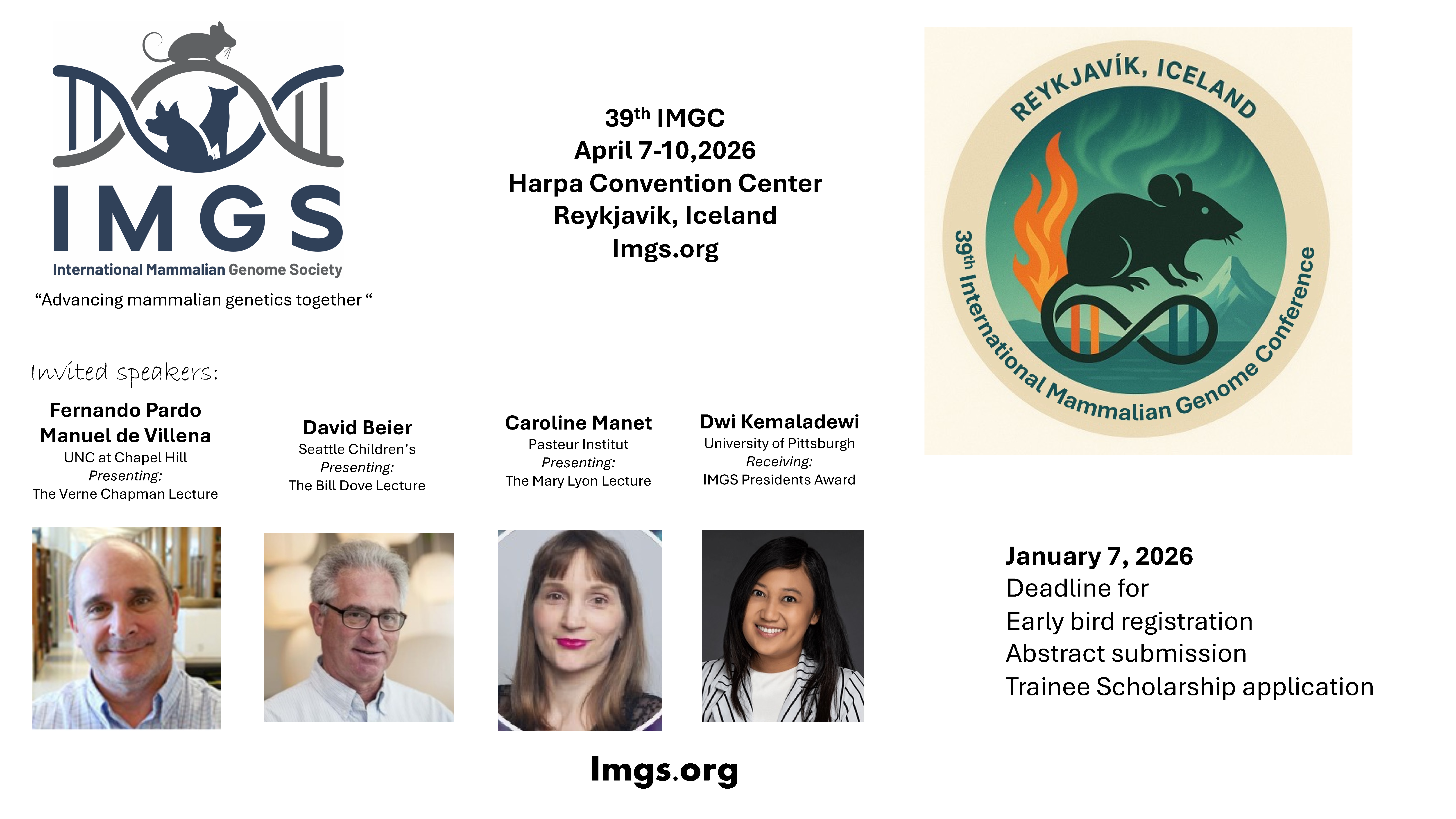
The 39th IMGC will be held at the Harpa in Reykjavik, Iceland from April 7-10, 2026
For those of you new to an IMGC there are workshops and a Trainee Symposium (where trainees present mainly to audience of their peers and 3 are selected to give a presentation in the main meeting).
Then there are three days of scientific sessions (posters and talks), mainly chosen from submitted abstracts.
We expect 150-200 participants representing the major rodent and other mammalian laboratories worldwide.
Scholarships are available for trainees (students and post-docs) to attend.
April 7, 2026 - April 10, 2026
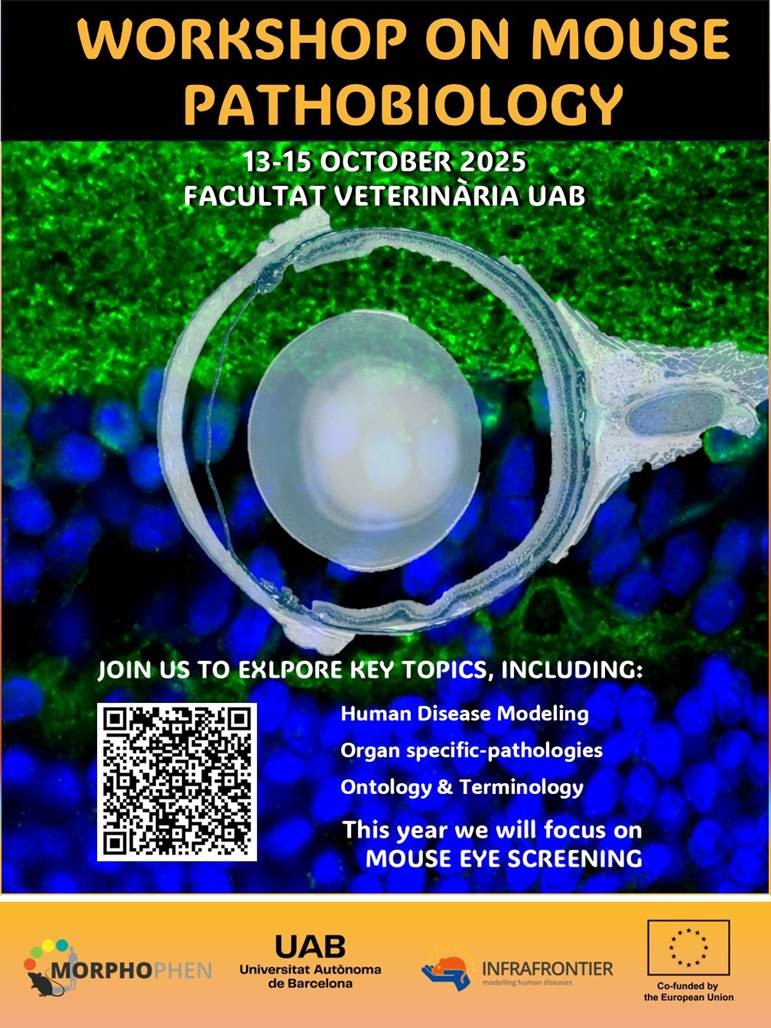
This workshop will adress key topics, including human disease modelling, morphological phenotyping, organ specific pathologies, and ontologies
This workshop is embedded in MorphoPHEN, the Erasmus Mundus Joint Master on Human Diseases Models Morphological Phenotyping. It which will be held on 13-15 october 2025 at the Universitat Autònoma de Barcelona (UAB), Spain.
Relying on the skills and experience of 18 renowned scientists, the workshop will revolve around key topics, including human disease modelling, morphological phenotyping, organ specific pathologies, ontology and new models.
Attendance at the workshop is free, but the registration is mandatory by sending an e-mail to: coordinacio.master.morphophen@uab.cat
The program can be found HERE.
Oct. 13, 2025 - Oct. 15, 2025

The LAG-R framework (Laboratory Animal Genetic Reporting) is a set of guidelines to support more complete documentation of the genetic make-up of animals of all species that are used in research
The LAG-R framework (Laboratory Animal Genetic Reporting) has just been published in Nature Communications (https://doi.org/10.1038/s41467-024-49439-y). The LAG-R framework is a set of guidelines to support more complete documentation of the genetic make-up of animals that are used in research, with the aim of bolstering reproducibility, reliability, and overall scientific rigour.
The biomedical research community is addressing many different factors that lead to problems with reproducibility, including via the implementation of the PREPARE guidelines, which aim to improve experimental design, and the ARRIVE guidelines, which aim to improve reporting of animal research experiments. However, a need remains for a more comprehensive description of the genetics of research animals, as differences in genetic background that are too often perceived as subtle can have a significant impact on phenotype and genetic modifications are rarely fully documented.
The LAG-R guidelines are designed to improve the documentation that is associated with animal research and to be applicable to the full range of animal species used. Standardising and improving genetic documentation will enhance research reliability and reduce wastage of resources and animals by cutting down on the reconstitution of missing information or on follow-up experiments that unknowingly use animals with different genetics.
The LAG-R guidelines have been developed by an international team that includes authors from 15 countries, working within a number of international consortia, including the Asian Mouse Mutagenesis Resource Association, the International Mammalian Genome Society, the International Mouse Phenotyping Consortium, the European Research Infrastructure for Modelling Human Diseases (INFRAFRONTIER), the International Society for Transgenic Technologies, the Mutant Mouse Resource & Research Centres, and Phenomics Australia.
The authors said: “The LAG-R Guidelines are not about influencing what models researchers use for their research. They are about standardising the way the genetics of these animals are documented. This framework is intended to be simple to adopt and takes in account the diversity of research environments where animals are used. Documentation is a key part of research reproducibility!"
July 8, 2024
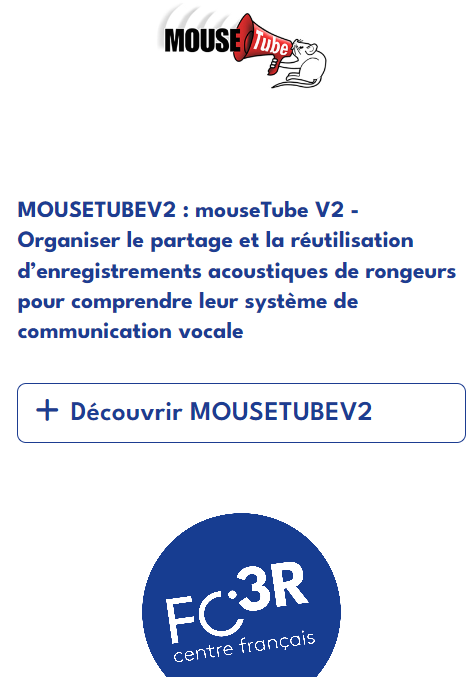
Le projet MOUSETUBEV2 dans lequel l’ICS participe est Laureat de l’appel à projet FC3R2023
Ce projet porté par le Dr Elodie Ey de l’IGBMC et Nicolas Torquet de l’ICS vise à développer une nouvelle version de MouseTube une base de données de vocalisations ultrasonores de souris. Ces avancées permettront un traitement automatisé des données, partagées en accès ouvert, et ainsi faciliteront les découvertes dans ce domaine tout en réduisant le nombre d’animaux utilisés en expérimentation.
May 7, 2024
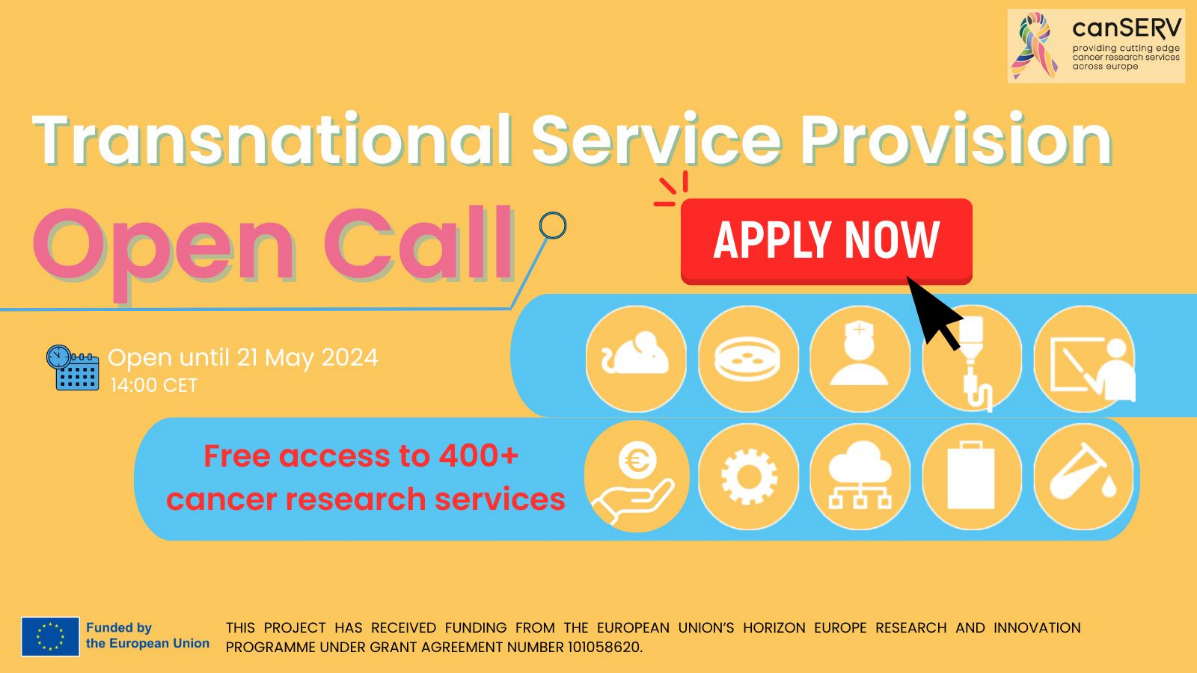
Infrafrontier is pleased to announce The OPEN CALL for Transnational Service Provision of canSERV, a European-funded project.
If you work in the field of oncology, do not miss this unique opportunity to utilise over 400 cutting-edge cancer services FREE-OF-CHARGE via this pan-European project.
What does INFRAFRONTIER offer?
1. Generation of precision cancer mouse models using CRISPR-Cas9
2. In-depth cancer-based phenotyping
3. Cancer and gut microbiota interaction pipeline in mouse models
4. Secondary phenotyping of cancer mouse models
5. Intravital microscopy (IVM) with fluorescent biosensors in mouse models of cancer
6. Digital pathology and Machine Learning-based image analysis
View Infrafrontier services in detail here 🐁 🧬 🔬 🧫 🔍.
⚠️ We can guide you through the application process: proposals@infrafrontier.eu
Deadline: 21 May 2024 at 14:00 CET!
Deadline: May 21, 2024
https://www.canserv.eu/calls/open-call-for-transnational-service-provision/
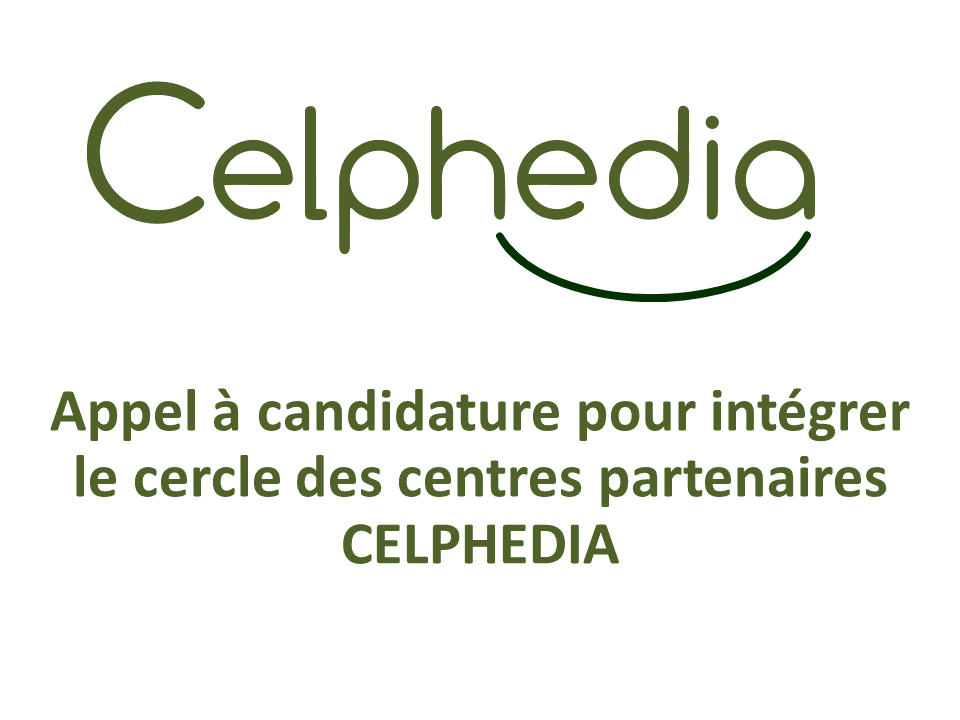
Dans le cadre de l’évolution de son périmètre, CELPHEDIA lance un appel à candidature pour créer un cercle de centres partenaires comprenant d’autres structure/plateforme de recherche
Dans le cadre de l’évolution de son périmètre, CELPHEDIA (Création, ELevage, PHEnotypage, DIstribution et Archivage d'organismes modèles) lance un appel à candidature pour créer un cercle de centres partenaires comprenant d’autres structure/plateforme de recherche, afin d'étendre son périmètre à d’autres organismes modèles ou à d'autres domaines d'activités.
CELPHEDIA est une infrastructure nationale opérationnelle de recherche (IR), distribuée sur le territoire français. Elle s’appuie sur 15 ans d’expérience et combine l’expertise, les compétences et les connaissances de treize centres dans les domaines de la création, de l'exploration fonctionnelle, de l'archivage et de la distribution d'organismes modèles, incluant les non-mammifères, les rongeurs et les primates non-humains. Sa mission consiste à soutenir la communauté scientifique académique et industrielle, en proposant des services standardisés et personnalisés, offrant des opportunités uniques pour stimuler la recherche biomédicale et accélérer les découvertes scientifiques, tout en respectant et promouvant les principes éthiques et le bien-être animal.
Outre les 13 centres composant le cœur de CELPHEDIA, le réseau CELPHEDIA est étendu à une cinquantaine de centres dont certains participent à des projets collaboratifs coordonnés par les centres de CELPHEDIA. Pour répondre à de nombreuses demandes de plusieurs structures ou plateformes françaises de travailler au près de CELPHEDIA, les tutelles de l'IR soutiennent la labélisation de centres "CELPHEDIA-Partenaires" qui viendront apporter de nouvelles compétences et expertises à l'infrastructure et partager une vision commune de service à la communauté scientifique. Ces centres devront s'engager pour :
Le partage de cette vision commune et des engagements stratégiques et sociétaux pour répondre aux exigences des parties intéressées nécessitera de :
La labélisation se fera sur les critères suivants :
Formalités de candidatures :
Les candidatures seront évaluées par le comité de direction de CELPHEDIA. Des informations complémentaires pourraient être demandées pour évaluer les candidatures. Les résultats seront publiés et transmis à partir du 24 févier 2024.
Dec. 14, 2023 - Jan. 21, 2024
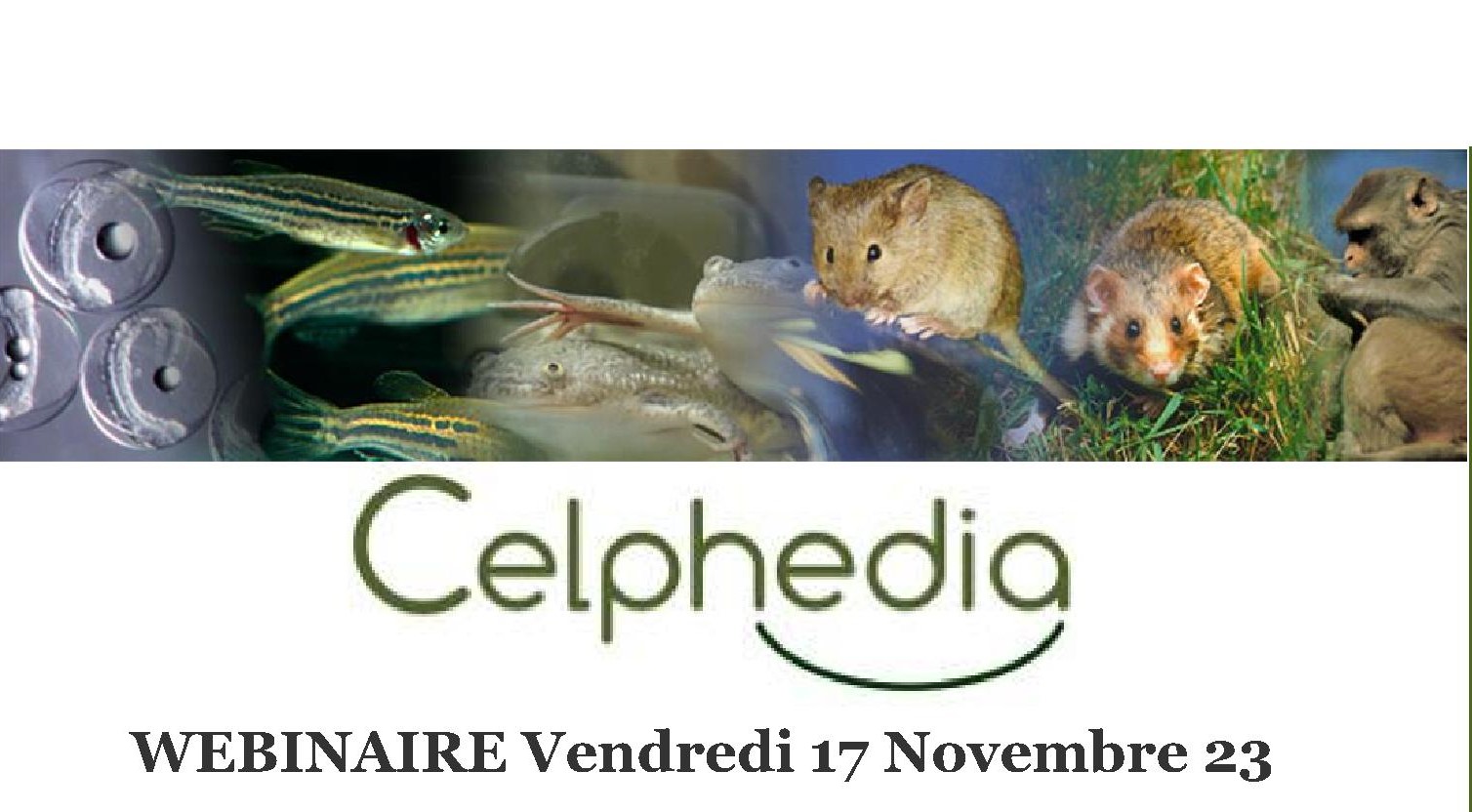
Les conférences aborderont l'impact du microbiome sur le fonctionnement normale et pathologique chez différentes espèces animales et chez l'homme.
Les nombreuses études menées sur une variété de modèles animaux ont confirmé l'influence du microbiote sur la santé et son rôle dans le déclenchement de diverses maladies. Ces dernières années, la recherche démontre l’importance du rôle du microbiote comme cause et/ou conséquence de nombreux phénotypes chez les animaux. Certaines bactéries, par exemple, peuvent avoir un rôle pathogénique et d’autre un rôle bénéfique. La complexité des interactions entre l’hôte et son microbiote est également de mieux en mieux étudiée, et l'importance des facteurs environnementaux ou de la génétique de l'hôte est mise en évidence.
Programme est disponible ici
The sypmosium is accessible in Webinar only. Registration is free, but mandatory on: https://celphediacolloq.sciencesconf.org
Connection details will be sent independently after your registration, before 17/11/2023
Nov. 17, 2023
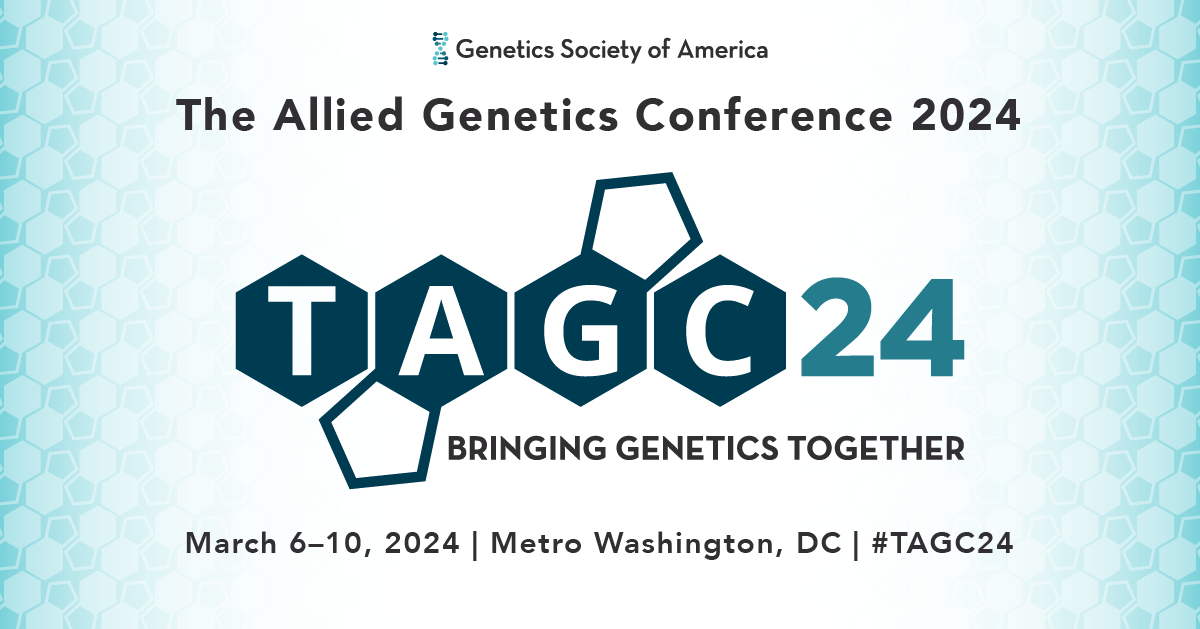
TAGC 24, a unique conference with innovative sessions Bridging Genetics Together.
TAGC is a unique conference organized by the Genetics Society of America offering innovative sessions in areas of genomics, neurogenetics, technology, disease model organisms, translational approaches. It also offers abundant opportunities of interactions between scientists from across the world and various research communities, to reach new audience, expand networks, engage discussions in important topics like equity, inclusion and professional development.
Join us March 6–10, 2024, in the Washington, DC, metro area or online.
March 6, 2024 - March 10, 2024
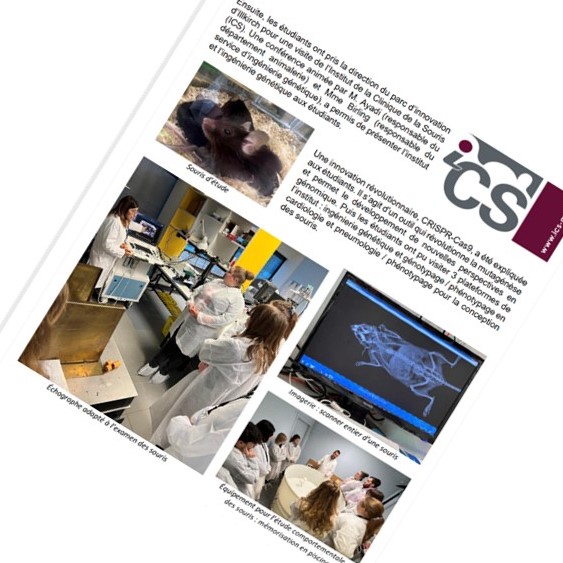
Students from Stanislas-Nancy high school visted the ICS in the context of their Alsace tour.
During their vist, their had the oppotunity to discuss with the animal facility and the genetic engeneering services leaders, and appréciate diverse genetic and phenotyping tools.
Feb. 27, 2023

Human Diseases Models Morphological Phenotyping (MorphoPHEN) consists of an integrated and interdisciplinary Erasmus Mundus Joint Master
MorphoPHEN is a one-year Master (60 ECTS), divided in two semesters of 30 ECTS each. It brings knowledge on the four main branches necessary to analyze mouse disease models morphologically: Anatomy and Embryology, Pathology, Imaging, and Deep Learning.
In addition to the MorphoPHEN partner universities (Autonomous University of Barcelona, University of Naples Federico II, Aristotle University of Thessaloniki, and the Veterinary School of Lisbon), 11 associated partners embedded in the biomedicine sector, including other universities, research institutions and companies have come together to produce an educational program to teach mouse morphological phenotyping.
Importantly, the MorphoPHEN consortium will provide 19 grants for students each year. For more information and applications visit the website https://morphophen.eu/.
Deadline: March 31, 2023
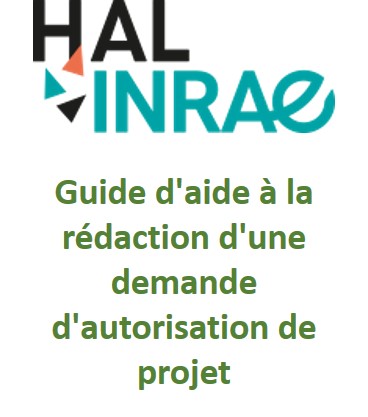
Project authorization drafting
The purpose of this guide is to help designers in the drafting of a project authorization involving the use of living animals for scientific purposes. It has been designed by the CELPHEDIA working group "Ethics and Animal Welfare" on the basis of version 1.2.0 of the APAFiS-EU application.
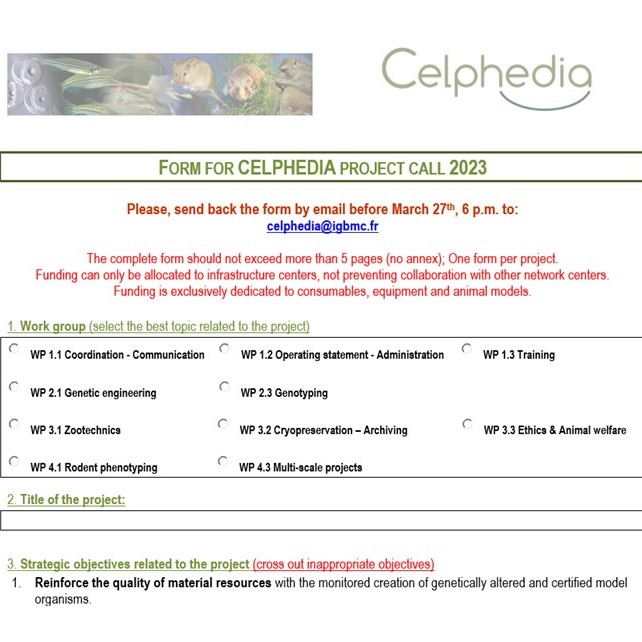
CELPHEDIA is pleased to announce the launch of the 2023 call for the collaborative projects between its the partner centers with the support of the CNRS.
Projects will be selected on the basis of the following 4 criteria:
1) Excellence of the proposal
2) Scope of the project for CELPHEDIA and for the scientific community
3) Structuring effect of the project at CELPHEDIA level, involving the participation of at least two partner centers of the CELPHEDIA research infrastructure
4) Response to at least one of the 5 strategic axes defined in the attached form.
Projects must be written in English as they will be evaluated by independent experts.
Completed forms must be returned imperatively by Monday March 27, 2023 at 6 p.m., latest deadline, by email to celphedia@igbmc.fr
It should be reminded that funding can only be allocated to the partner centers of the CELPHEDIA infrastructure, which does not prevent the collaboration of other centers of the CELPHEDIA Network.
It should be reminded that the funding allocated will only be used to cover consumables, small equipment, animals necessary for the development of the project and mission costs, but exlude staff costs.
Feb. 8, 2023 - March 27, 2023

Savoir(s), le quotidien de l’Université de Strasbourg, a consacré un dossier complet à l’institut clinique de la souris à l’occasion de ses 20 ans.
Visite en images des locaux, un reportage vidéo au sein du département de phénotype, et des interviews du directeur et de la vétérinaire référente du site.
https://savoirs.unistra.fr/eclairage/institut-clinique-de-la-souris-des-rongeurs-et-des-hommes
Jan. 19, 2023 - Dec. 31, 2023
https://savoirs.unistra.fr/eclairage/institut-clinique-de-la-souris-des-rongeurs-et-des-hommes
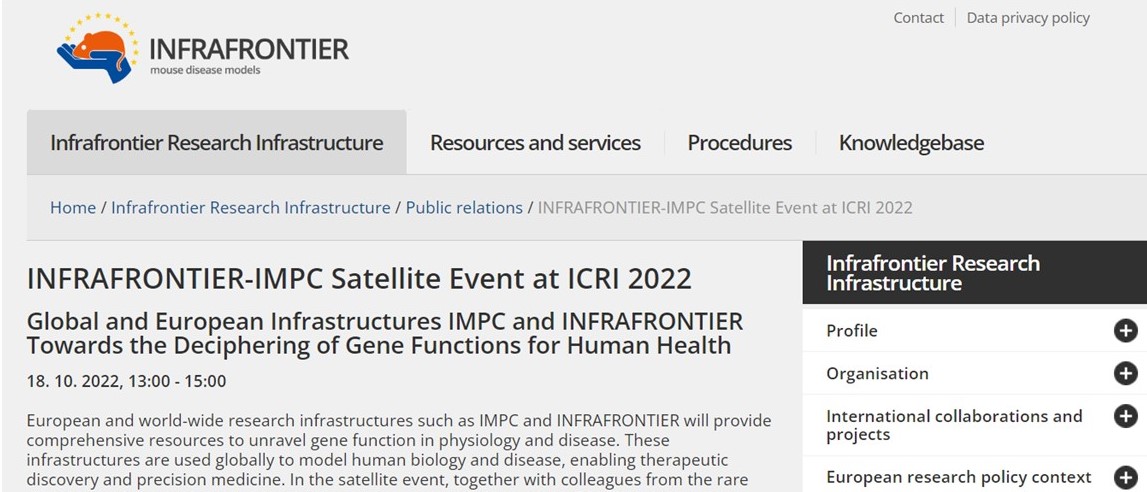
The IMPC/Infrafrontier are organising a Satellite event at the ICRI 2022 - International Conference on Research Infrastructures(RIs) in Brno, Czech Republic on Tuesday 18 October 2022.
Our event is titled ‘ IMPC and Infrafrontier: Global and European Infrastructures towards the deciphering of gene functions for human health’ and runs from 1pm-3pm CET / 7am-9am ET / 8pm – 10 pm Seoul.
The programme can be found here and general information can be reached on the ICRI website here.
Oct. 18, 2022
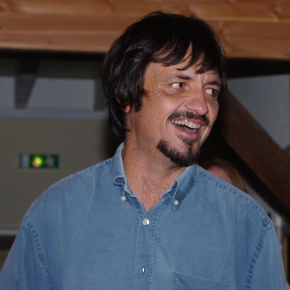
C’est avec une immense tristesse que l’Institut national des sciences biologiques (INSB) et CELPHEDIA ont appris le décès de Jean-Stéphane Joly, âgé de 55 ans, le 16 septembre 2022.
C’est avec une immense tristesse que l’Institut national des sciences biologiques (INSB) et CELPHEDIA ont appris le décès de Jean-Stéphane Joly, âgé de 55 ans, le 16 septembre 2022. Directeur de recherche Inrae, il développait ses travaux au sein de Institut des Neurosciences Paris-Saclay (NeuroPSI),et pilotait l’unité d’appui à la recherche (UAR) Tefor Paris-Saclay.
https://www.insb.cnrs.fr/fr/cnrsinfo/hommage-jean-stephane-joly

NeurATRIS “Translational Neuroscience Day” is back for its fourth edition on December 06, 2022, at the Cité Internationale Universitaire de Paris.
Co-organized with Celphedia, this new edition will be focused on animal models in neuroscience translational research and related hot topics.
Join us to learn more about current research in translational research, through 3 plenary sessions and 1 round table led by French key opinion leaders.
Take advantage of this day to interact with all key actors in the field: academic researchers, clinicians, biotech, and pharmaceutical companies.
Young researchers, do not miss the opportunity to highlight your work and submit an abstract to the “Next Generation Challenge”!
Registration opens on September 1th, 2022
More details on program and registration coming soon.
Dec. 6, 2022
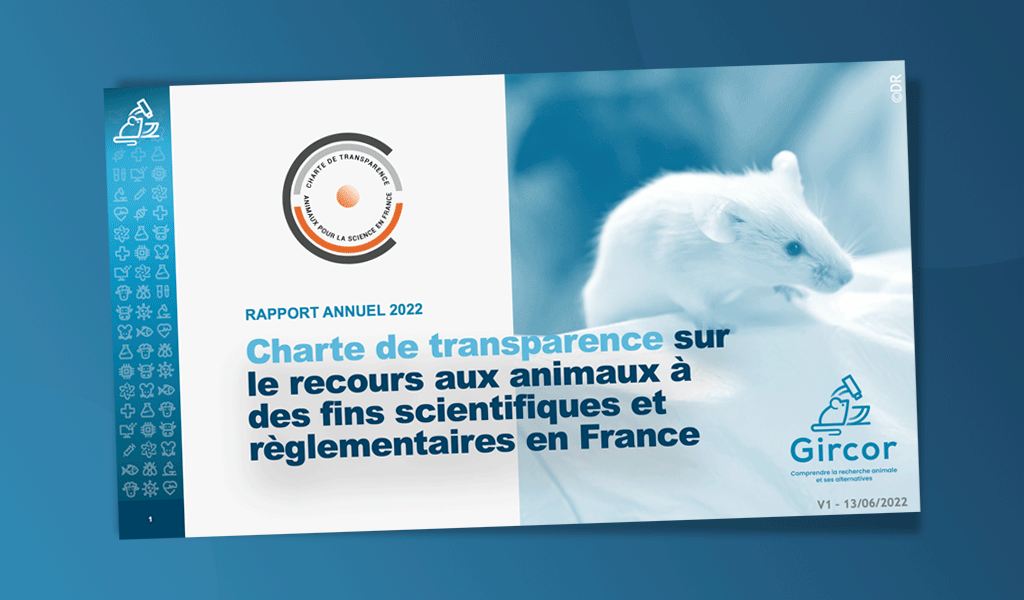
38 major players in research in France take stock of the first year of the implementation of the Transparency Charter on the use of animals for scientific and regulatory purposes.
38 major players in research in France take stock of the first year of the implementation of the Transparency Charter on the use of animals for scientific and regulatory purposes.
Why a Transparency Charter?
The use of animals in research is a complex and controversial subject. The scientific community is now aware that the general public needs to be informed about why and how animals are used in order to put an end to many preconceived ideas. In this context, the first Transparency Charter on the use of animals in research has been launched in February 2021. Its goal: communicating about animal research with the public.
The first charter report
Even if the pandemic situation has been an obstacle to carry out some communication actions, the 38 signatories of the Charter have assessed this first year of transparency. Among their conclusions, it is clear that this Charter has made it possible to enable the general public to understand the value of animal use and to improve the image of research.

Cédric Villani, député de l’Essonne et président de l’Office Parlementaire d'Évaluation des Choix Scientifiques et Technologiques (OPECST), a été invité à visiter et à rencontrer le personnel de...
Cédric Villani, député de l’Essonne et président de l’Office Parlementaire d'Évaluation des Choix Scientifiques et Technologiques (OPECST), a été invité à visiter et à rencontrer le personnel de deux animaleries de recherche situées près de Strasbourg (67).
A l'issue de ces visites, Cédric Villani a souligné l'importance des contrôles et des regards extérieurs. La composition des comités d'éthiques fait également partie de ses préoccupations. Il a particulièrement été marqué par l'investissement des professionnels avec lesquels il a pu échanger.
Feb. 11, 2022
https://www.gircor.fr/transparence-cedric-villani-visite-deux-animaleries-de-recherche-a-strasbourg/

The 6th edition of small animal imaging school is willing to consider all in vivo imaging modalities.....
The 6th edition of small animal imaging school, organized by Cancéropôle Grand Sud-Ouest, CREFRE-Anexplo and IPBS-TRI (GenoToul platforms), is willing to consider all in vivo imaging modalities (anatomical, functional and molecular) as well as longitudinal follow-up of animals.
June 12, 2022 - June 16, 2022

FROM THE BEGINNING OF 2022, WE INVITE YOU TO CELEBRATE OUR 20 YEARS !
The 20th anniversary of the ICS (Institut Clinique de la Souris) coincides with the 20th anniversary of the sequencing of the mouse genome!
Over the past 20 years, ICS has made significant contributions to the study of gene function and to innovations that have transformed the research landscape in this field. On this occasion, the entire ICS staff invites you to participate in meetings, exchanges, visits, workshops, webinars and debates.
We hope to give everyone the opportunity to exchange, including meeting our users and our partners and celebrate this anniversary together.
Jan. 1, 2022 - Dec. 31, 2022
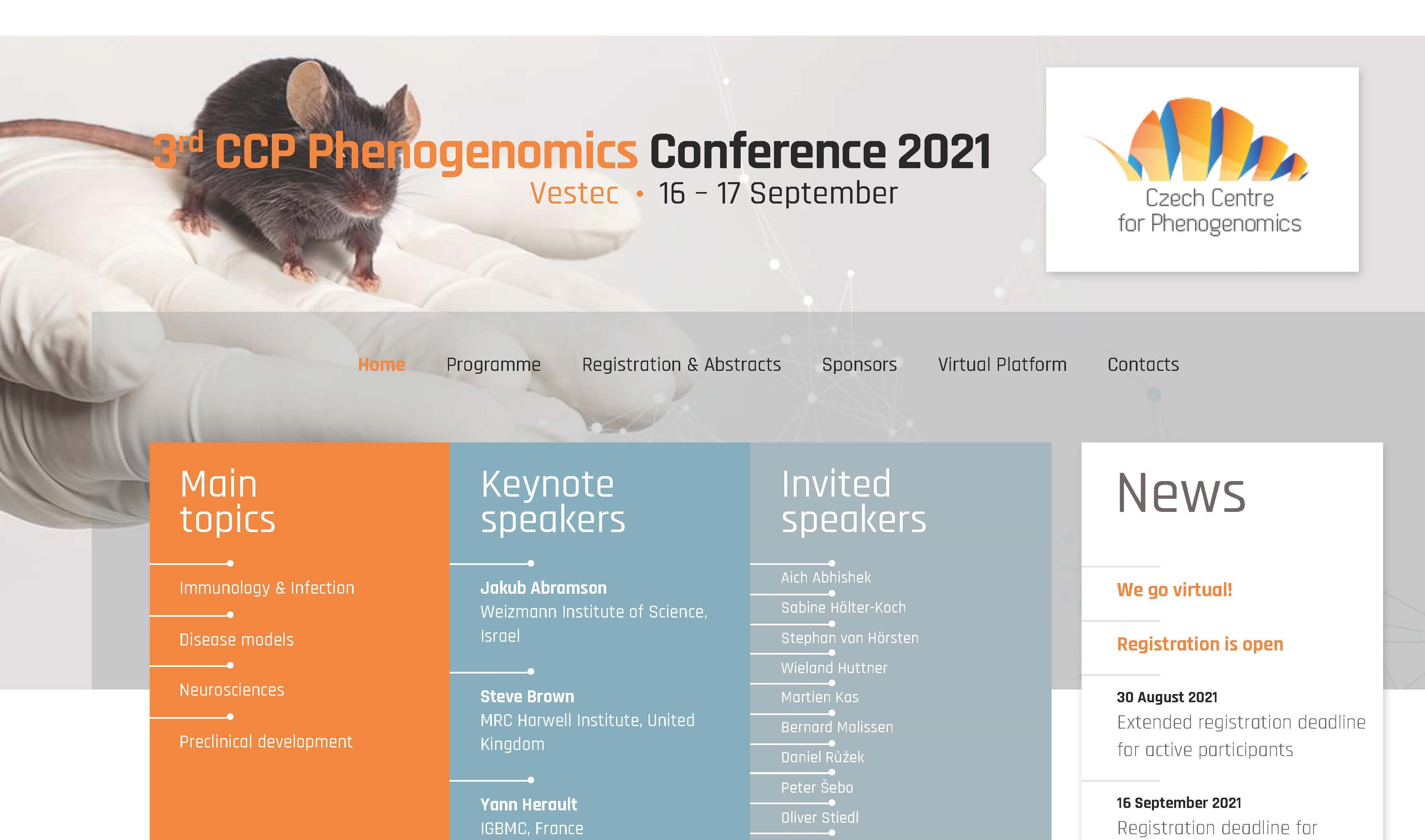
The CCP Conference program and speakers have now been announced!
-Immunology, infectious diseases, and human diseases models.
-Preclinical development and advances in neuroscience.
SAVE the DATE !
Sept. 16, 2021 - Sept. 17, 2021
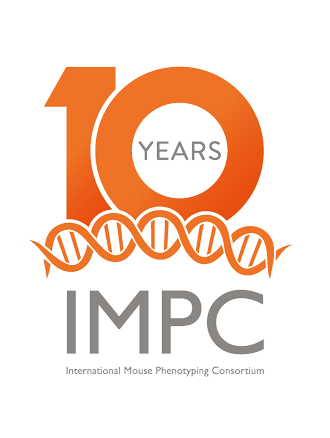
The IMPC is celebrating 10 years of research on mouse knockout production and phenotyping. We are hosting an array of exciting events such a monthly workshops, meetings and attending conferences.
A 2 day virtual meeting with international reach! International leading speakers from outside IMPC, as well as IMPC speakers, will reflect on the role of mouse genetics in biomedical research and genomics medicine, and the contributions of IMPC to these achievements.
2 Day EventVirtual/ Conference – IMPC
Sept. 23, 2021 - Sept. 24, 2021
https://www.mousephenotype.org/about-impc/impc-10-year-anniversary/
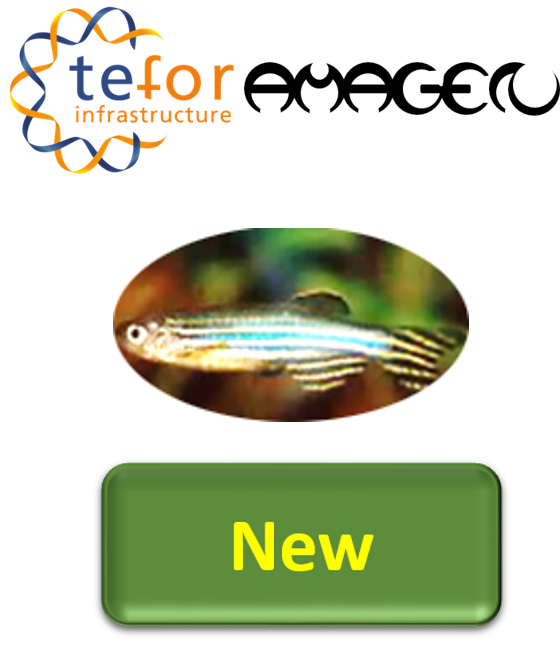
Immersion training in a center working on zebrafish and medaka models: Management of an aquatic facility - Injection and transgenesis

Regulatory training designed for Anglophone students and researchers having a direct scientific responsibility for experimentation on animals.
The training program of 57 hours (over 7 days) is designed for Anglophone students and researchers having a direct scientific responsibility for experimentation on animals.
The teaching will focus on regulatory and legislative initiatives in animal experimentation in accordance with European and national regulation. It will also provide basic knowledge on the handling and use of laboratory rodents (animal welfare, ethics, cognition and behaviour, pain and stress, anaesthesia, analgesia, euthanasia, pathologies, zootechnics, anatomy, physiology, genetic engineering, phenotyping, imaging, alternative methods, biostatistics), as well as the selection criterion of an animal model.
This regulatory training is organized by CE2F-PRIM and held with the collaboration and the assistance of all the partner centers of CELPHEDIA. It will take place on July 3-11, 2016, in Marseille and might be limited to non-Francophone students and researchers working in a CNRS unit.
To register, create an account on the link Registration
July 3, 2017 - July 11, 2017
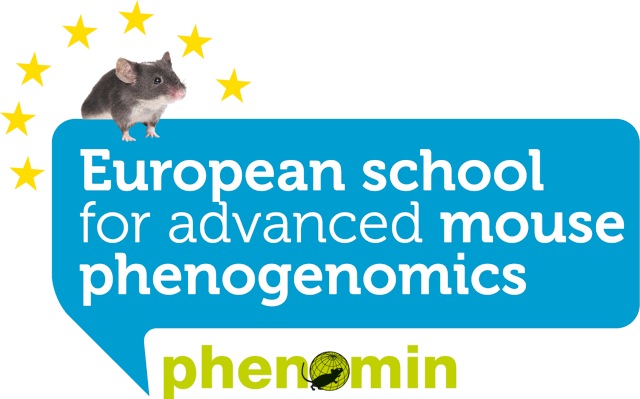
International training focused on best practices in the use of the mouse model for biomedical research
Good practices: use of mouse models for biomedical and scientific research
Would you like to learn how to choose, create and analyze your best mouse model? Do you have a sufficient background in mouse functional genomics to lead at best your research?
This international training of excellence provides engineers, PhDs and researchers with an innovative program focused on best practices in the use of the mouse model biomedical and scientific research. Reach us and you will gain crucial skills required to use as best mutant mice and support you in your research!
It provides a wealth of information on good practices in the use of mouse model (standardized techniques, ethics, regulations, analysis, data and resources ...) to support attendees in their research.
The training takes place in Goersdorf-Liebfrauenberg (North of Alsace, France) from June 12 th to 16th.
June 12, 2017 - June 16, 2017
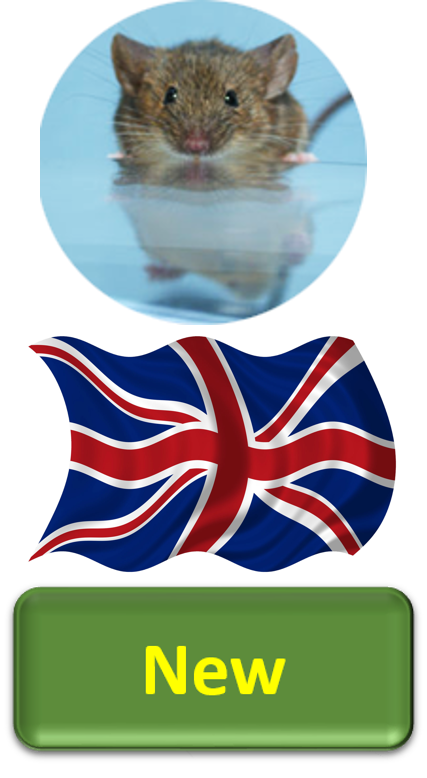
Training in ENGLISH: general framework to learn the basic knowledge and know-how in phenotyping
The training course is given in English and opened to graduate students (PhD), post-doctoral scientists, researchers and engineers. Alternating theoretical courses and practical workshops, this training aims to provide a general framework to learn the basic knowledge and know-how in phenotyping in order to answer “What’s wrong with my mice”
① Understand the interest of phenotyping to characterize gene function in mouse models,
② Learn about the scientific and ethical considerations in phenotyping,
③ Hear about the current web resources available,
④ Interact and consult with the experts on your own scientific project.
Attendees must have a basic knowledge in mouse physiology and to be able to handle mice.
Training "CNRS formation entreprises" in Illkirch (outskirts of Strasbourg)
March 14, 2017 - March 17, 2017
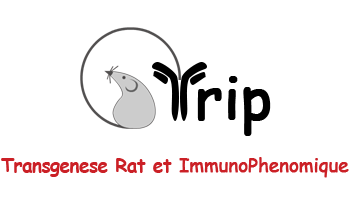
The "Transgenic Rat" meeting will update information on techniques and models in transgenesis and genetic engineering.
This meeting is organized by the “Transgenic rats” core facility, SFR François Bonamy, Biogenouest, TEFOR and IBiSA. The quality of the speakers is of the highest international level. The meeting will give the opportunity to update information on techniques and models in transgenesis and genetic engineering. It is intended for Master, PhD and medical students with a background in molecular biology and genetics as an introduction to future work in these rapidly developing areas of research. It is also intended for post-docs and scientists already working in certain of these fields and who are interested in expanding their knowledge on the potential applications of these new techniques to their models or in neighbouring pathophysiological models of analysis of genes or diseases using genetically modified animals.
May 11, 2017 - May 12, 2017

Launch of the 3rd joint call "Mouse Models & Rare Diseases" by the Foundation for Rare Diseases and PHENOMIN
The French Foundation for Rare Diseases (Fondation maladies rares) and the French National Infrastructure PHENOMIN are pleased to launch their 3rd joint call for the creation and exploration of mouse models for rare diseases.
The call aims to give a significant boost to the development of mouse models, in order to
- gain a better understanding of the pathophysiological mechanisms involved in rare
diseases whose defective genes have been identified;
- test and validate therapeutic proofs of concept, at the pre-clinical in vivo level.
This call aims to create and caracterise consitutive (Ko) and conditional Knock-Out (cKO), Knock-In (KI) and transgenic (TG) mouse models in the field of rare diseases.
Upload the call fo proposal
Submission on line
Submission deadline for proposals: February 9, 2017, 5:00 pm
Feb. 9, 2017
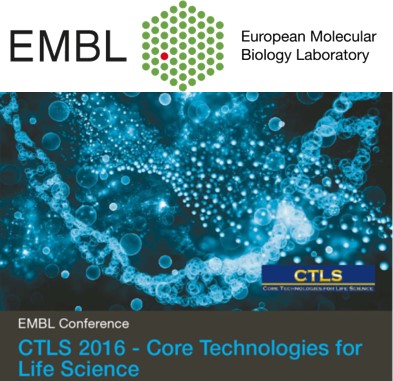
CTLS 2016 gathers scientists, decision makers and opinion leaders, involved in Core Technology Facilities of Life Science.
CTLS 2016, organized by EMBL, aims to bring together not only scientists, technicians and managers, but also decision makers and opinion leaders involved in Core Technology facilities and resource laboratories in all fields of Life Science.
Building on the success of CTLS 2014 in Paris, this meeting will be a unique opportunity to listen and discuss with colleagues and peers about challenges and solutions on all scientific, technological, managerial funding, educational and community building aspects of core facilities and infrastructures.
Keynote lectures will provide the big picture of this dynamic field, complimented by five plenary sessions comprising both oral and poster presentations, which will allow presenters and attendees to explore and discuss issues concerning European core facilities and infrastructures. There will also be ample opportunity for existing and prospective core facility networks or interest groups to organise satellite meetings.
Topics: transversal issues concerning, Core Facilities in Life Sciences (CFLS)
CTLS meeting will be held in EMBL Heidelberg, Germany on June 12-15, 2016
Detailed description & registration
June 12, 2016 - June 15, 2016
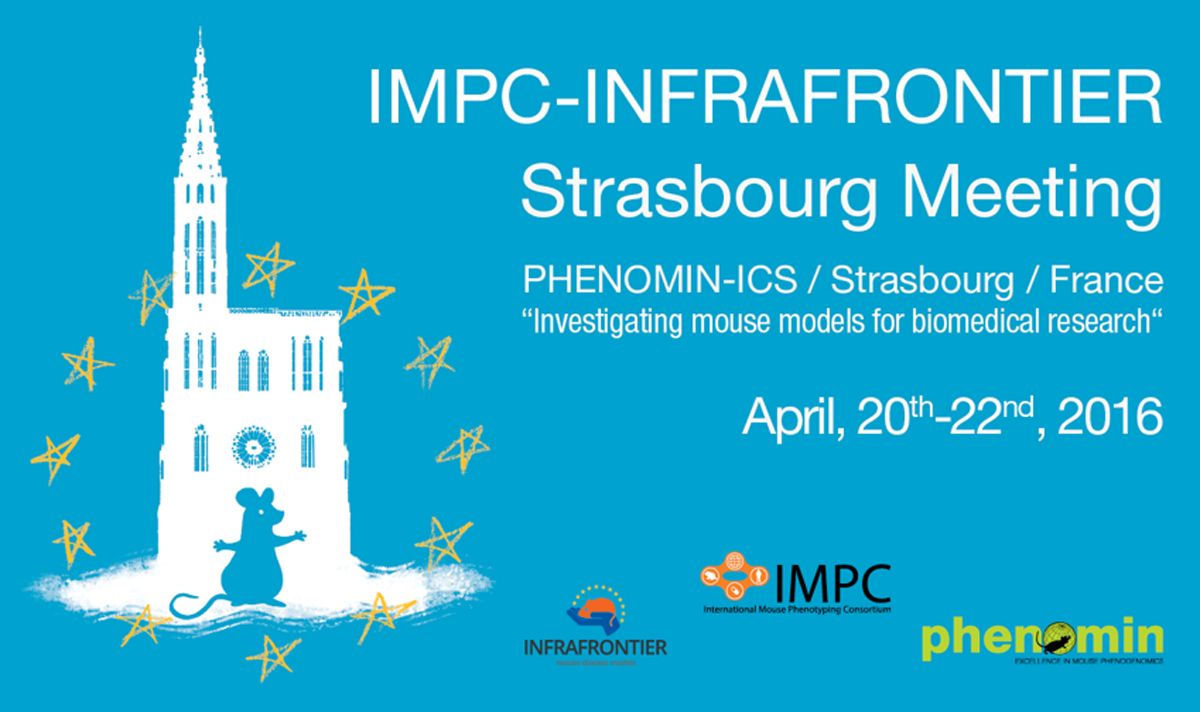
Investigating mouse models for biological for research
The congress aims to promote the International Mouse Phenotyping Consortium (IMPC) mouse lines, importance of mouse phenotyping & clinical and drug discovery collaboration, to present progresses performed by IMPC with regards CRISPR editing genome, rare diseases, microbiota and ageing pipeline, as well as illustration of examples of scientific projects about “Animal models for human diseases” and recent developments in mouse models phenotyping imaging.
We count on the attendance of 200 total participants every day including researchers of regional, national, European and international prominence and IMPC members and funders. The IMPC congress will be held on April 20-22, 2016 in Illkirch, France.
Description of the meeting
Detailled program
April 20, 2016 - April 22, 2016
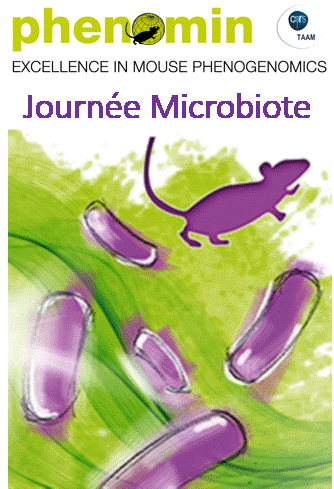
During this meeting, experts will overview the current studies of the microbiota and its interaction with the host.
A "Microbiota and animal model" meeting is organized by the National Infrastructure PHENOMIN in Orléans on 2016, March 15th.
It has been proved that microbiota has a strong impact on development and human health. The studying methods of these bacterial populations and their interactions with host cells are in a process of development. Some methods focus on animal models enabling to compare the impact of various monitored flora on the phenotype or to measure this impact according the genotype of modified animals.
With input from experts, the goal of this meeting is to overview the current studies of the microbiota and its interaction with the host. It is also an opportunity to visit a rodent animal facility with more than 10 years of expertise in maintaining genetically modified animals with a monitored flora.
Program & Registration
March 15, 2016
http://www.celphedia.eu/site-media/docs/carton_invitation_TAAM_microbiote-12-01-2016.pdf
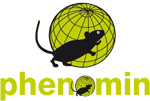
The National Infrastructure PHENOMIN is pleased to announce the results of its 6th Call: Generation and Characterization of CreERT2 cell specific promoter driven deleter mouse lines.
The National Infrastructure PHENOMIN is pleased to announce the results of its 6th Call: Generation and Characterization of CreERT2 cell specific promoter driven deleter mouse lines. The Scientific Committee has selected 13 projects amongst 34 submitted projects from 20 PI. Consequently, 9 additional CreERT2 mouse lines will be generated by PHENOMIN team and will be made available as soon as possible for the scientific community. 4 CreERT2 mouse models been already generated by the European EUCOMMTOOLS consortium, will be further characterized.
You will find the details of the selected models on: http://www.phenomin.fr/calls/current-call/#phenomin-6th-call-results
To get more information, contact mutagenesis@igbmc.fr
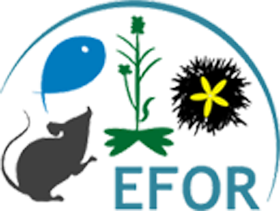
As every year, the EFOR meeting will be dedicated to the various animal models used in scientific research.
The EFOR network is delighted to announce its 7th annual meeting in Paris on 2016, March 7th and 8th!
Thematic sessions will be held on the first day (March 7th): Models for studying stem cells from different tissues.Models for studying cerebrovascular accident. New imaging technologies and data processing tools. Genome editing in animals: ethical questions
The second day (March 8th) is devoted to parallel workshops, each dedicated to a model or a class of models: zebrafish, nematods, non-human primates, avian models, marine metazoa, lepidoptera, arthropoda, drosophila.
Preliminary program
To register, please contact djian@inaf.cnrs-gif.fr
March 7, 2016 - March 8, 2016
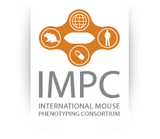
Benefits and challenges of applying the guidelines for the IMPC
The Animal Research Reporting of In Vivo Experiments (ARRIVE) guidelines were developed to address the lack of reproducibility in biomedical animal studies and improve the communication of research findings. While intended to guide the preparation of peer-reviewed manuscripts, the principles of transparent reporting are also fundamental for in vivo databases. Here, we describe the benefits and challenges of applying the guidelines for the International Mouse Phenotyping Consortium (IMPC), whose goal is to produce and phenotype 20,000 knockout mouse strains in a reproducible manner across ten research centres. In addition to ensuring the transparency and reproducibility of the IMPC, the solutions to the challenges of applying the ARRIVE guidelines in the context of IMPC will provide a resource to help guide similar initiatives in the future.
More information on PLOS biology
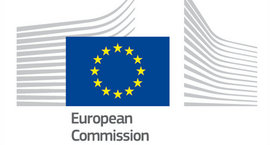
Issue of the communication
The European Commission has issued a communication regarding the European Citizens’ Initiative “Stop Vivisection” which aimed to repeal to current European Directive 2010/63/EU (see our news published on March 31, 2015).
In brief this initiative has been rejected by the EC and no changes would be applied to the actual legislation. In fact, despite the EC recognizes the concerns expressed by the proponents of this initiative, the Directive has been confirmed to be the best compromise between animal welfare enhancement and biomedical researches requiring animal experimentations.
For more information, please consult the European Commission conclusion on http://ec.europa.eu/environment/chemicals/lab_animals/pdf/vivisection/en.pdf
http://ec.europa.eu/environment/chemicals/lab_animals/pdf/vivisection/en.pdf

A meeting to update information on techniques and models in transgenesis and genetic engineering.
This meeting is organized by the “Transgenic rats” core facility, SFR François Bonamy, Biogenouest, TEFOR and IBiSA. The quality of the speakers is of the highest international level. The meeting will give the opportunity to update information on techniques and models in transgenesis and genetic engineering.It is intended for Master, PhD and medical students with a background in molecular biology and genetics as an introduction to future work in these rapidly developing areas of research. It is also intended for post-docs and scientists already working in certain of these fields and who are interested in expanding their knowledge on the potential applications of these new techniques to their models or in neighbouring pathophysiological models of analysis of genes or diseases using genetically modified animals.
Program
Registration
July 2, 2015 - July 3, 2015
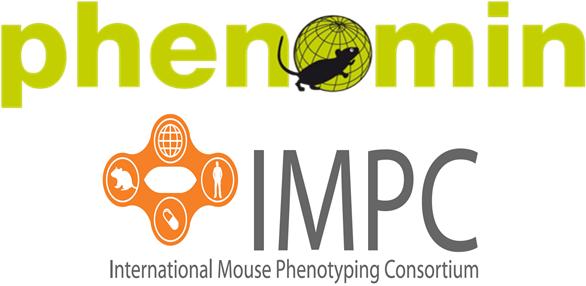
PHENOMIN is launching the 3rd Call for nomination in the frame of its partnership with IMPC
The National Infrastructure PHENOMIN PHENOMIN (CIPHE, ICS, TAAM) is pleased to announce the launch of the 3rd call for nomination in the frame of its partnership with the International Mouse Phenotyping Consortium (IMPC). This call for proposals is addressed to French-based research groups. It aims to establish and characterize mouse models: constitutive Knock-out (KO) and conditional Knock-Out (cKO). These knockout mice, together with the wealth of associated data, will serve as a valuable, freely available, resource for French researchers investigating gene function and human pathophysiology.
Since 2011, PHENOMIN has generated more than 150 models. In the frame of the IMPC more than 5,000 genes are already committed to the IMPC pipeline. Until the end of 2016, PHENOMIN will generate 100 additional knock-out lines. All these lines will be phenotyped through the standardized IMPC broad-based pipeline. Up to now, all models have been generated from ES mutant cells with conditional potential generated by the International Knockout Mouse Consortium (IKMC).
In the frame of this call, we have added constitutive knock-out models to be generated using CRISPR (clustered regularly interspaced short palindromic repeats) genome editing technology.
Conditions for eligibility:
For all models that will be selected, please consider that:
To apply to this call for proposal, please fill in the application form.
Extended application deadline: June 15th, 2015.
Deadline: June 15, 2015
http://www.phenomin.fr/calls/current-call/#phenomin-5th-call-for-proposals
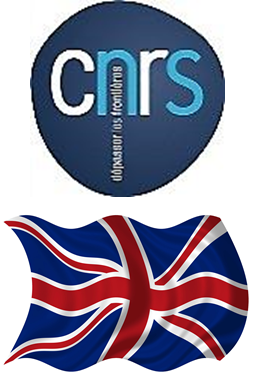
Regulatory training in English for staff developing experimental procedures and projects
Regulatory training in ENGLISH for staff developing experimental procedures and projects (former level I)
The training program of 57 hours (over 7 days) is designed for Anglophone students and researchers having a direct scientific responsibility for experimentation on animals.
The teaching will focus on regulatory and legislative initiatives in animal experimentation in accordance with European and national regulation. It will also provide basic knowledge on the handling and use of laboratory rodents (animal welfare, ethics, cognition and behaviour, pain and stress, anaesthesia, analgesia, euthanasia, pathologies, zootechnics, anatomy, physiology, genetic engineering, phenotyping, imaging, alternative methods, biostatistics), as well as the selection criterion of an animal model.
This regulatory training is organized by CE2F-PRIM and held with the collaboration and the assistance of all the partner centers of CELPHEDIA. It will take place from September 7th-15th 2015, in Marseille and might be limited to non-Francophone students and researchers working in a CNRS unit.
To register, create an account on https://formations.primato.cnrs.fr/createAccount.php
Send all enquiries to formation-experimentation@ipbs.fr
Sept. 7, 2015 - Sept. 15, 2015

Research projects supported by the Scientific Committee
The "Fondation maladies rares", in partnership with the national infrastructure PHENOMIN, supports research projects dedicated to the development and to the study of murins models in the field of the rare diseases.
This joint call for projects "Mouse models and rare diseases" aims to give a significant boost to the development of mouse models, in order to :
gain a better understanding of the pathophysiological mechanisms involved in rare diseases whose defective genes have been identified
test and validate therapeutic proofs of concept, at the pre-clinical in vivo level
This 2nd joined call supported the creation and the characterization of murins models of rare diseases: Knock-Out constitutive (KO)/ conditional (cKO), Knock-In (KI) and transgenic mice-.
The ad hoc Scientific Committee has supported 13 research projects.
Congratulations to the laureates !